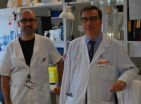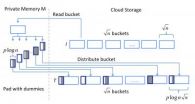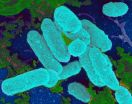(Press-News.org) Scientists at The University of Manchester are a step closer to understanding why diabetes is cured in the majority of patients that undergo gastric bypass surgery.
The research, published in the journal Endocrinology, shows the cure is likely to be explained by the actions of specialised cells in the intestine that secrete a cocktail of powerful hormones when we eat.
During the research, the team showed that gut hormone cells previously thought to contain just one hormone, had up to six hormones including the hunger hormone ghrelin.
Study team leader, Dr Craig Smith, a Senior Lecturer in Molecular Cell Physiology, said: "Our research centred on enteroendocrine cells that 'taste' what we eat and in response release a cocktail of hormones that communicate with the pancreas, to control insulin release to the brain, to convey the sense of being full and to optimize and maximize digestion and absorption of nutrients."
"Under normal circumstances these are all important factors in keeping us healthy and nourished. But these cells may malfunction and result in under or over eating."
75% of people suffering from obesity who also have diabetes are cured of diabetes after receiving a gastric bypass and Dr Smith says that understanding how bypass surgery cures diabetes is the crux of his team's research.
Dr Smith: "This is where things start to get really interesting because the most common type of gastric bypass actually also bypasses a proportion of the gut hormone cells. It is thought that this causes the gut hormone cells to change and be reprogrammed. For us, understanding how these cells change in response to surgery is likely to hold the key to a cure for diabetes."
In the UK, approximately 2.9 million people are affected by diabetes and the most common form of the disease is Type 2 diabetes which is linked to genes, ethnicity, obesity and diet.
"Understanding the messages the gut sends out when we eat food and when things go wrong, as is the case in diabetes, is our next challenge and hopefully one that will result in the development of drugs which could be used instead of surgery to cure obesity and prevent diabetes," said Dr Smith.
INFORMATION:
The research team also comprised John Mclaughlin who is Professor of Gastroenterology and Nutrition at The University of Manchester as well as Professor Robert Fenton's team based at the University of Aarhaus in Denmark.
Scientists discover clues why weight-loss surgery cures diabetes
2014-07-10
ELSE PRESS RELEASES FROM THIS DATE:
Straits of Mackinac 'worst possible place' for a Great Lakes oil spill
2014-07-10
ANN ARBOR – Because the strong currents in the Straits of Mackinac reverse direction every few days, a rupture of the oil pipeline beneath the channel would quickly contaminate shorelines miles away in both lakes Michigan and Huron, according to a new University of Michigan study commissioned by the National Wildlife Federation.
In one scenario examined in the study and accompanying animations, oil from a hypothetical pipeline break reached Mackinac Island and Round Island after 12 hours and Bois Blanc Island after two days. All three islands are in westernmost Lake Huron, ...
New drug active against most aggressive type of lung cancer cells
2014-07-10
Manchester scientists have shown that a new drug could prove useful in treating small cell lung cancer - the most aggressive form of lung cancer.
Scientists from the Cancer Research UK Manchester Institute, based at The University of Manchester and part of the Manchester Cancer Research Centre, teamed up with experts at AstraZeneca, as part of a collaboration agreed in 2010, to test a drug – known as AZD3965 - on small cell lung cancer cells.
The research, published in the journal Clinical Cancer Research, also helps identify which patients are most likely to respond ...
New therapeutic combination to slow resistant sarcomas
2014-07-10
Researchers at sarcomas research group at the Bellvitge Biomedical Research Institute (IDIBELL) and the Catalan Institute of Oncology (ICO) have been tested in 19 patients a new therapeutic combination to combat resistant sarcomas. The clinical trial results, which indicate that the new treatment could stabilize the growth of these tumors have been published this week in the British Journal of Cancer.
Sarcomas
Sarcomas are a rare type of tumor and complex since there are several subtypes. It can affect from children to older ages. It is usually diagnosed in advanced and ...
'Melbourne Shuffle' secures data in the cloud
2014-07-10
PROVIDENCE, R.I. [Brown University] — To keep data safe in the cloud, a group of computer scientists suggests doing the Melbourne Shuffle.
That may sound like a dance move (and it is), but it's also a computer algorithm developed by researchers at Brown University.
The computing version of the Melbourne Shuffle aims to hide patterns that may emerge as users access data on cloud servers. Patterns of access could provide important information about a dataset — information that users don't necessarily want others to know — even if the data files themselves are encrypted.
"Encrypting ...
The bigger the better: Cigarette warning labels prompt quit attempts
2014-07-10
WASHINGTON - Cigarette warning labels can influence a smoker to try to quit even when the smoker is trying to avoid seeing the labels, according to a survey of thousands of adult smokers in four countries published by the American Psychological Association.
Small, text-only warning labels like those on cigarette packs in the United States prompt people to think about health risks of smoking, and people who notice the warnings regularly are more likely to try to quit, the research found. Larger, more graphic warning labels like those in other countries, such as Australia, ...
Radio-burst discovery deepens astrophysics mystery
2014-07-10
The discovery of a split-second burst of radio waves by scientists using the Arecibo radio telescope in Puerto Rico provides important new evidence of mysterious pulses that appear to come from deep in outer space.
The finding by an international team of astronomers, published July 10 in The Astrophysical Journal, marks the first time that a so-called "fast radio burst" has been detected using an instrument other than the Parkes radio telescope in Australia. Scientists using the Parkes Observatory have recorded a handful of such events, but the lack of any similar findings ...
Working to loosen the grip of severe mental illness
2014-07-10
A neuroscientist at Rutgers University-Newark says the human brain operates much the same whether active or at rest – a finding that could provide a better understanding of schizophrenia, bipolar disorder and other serious mental health conditions that afflict an estimated 13.6 million Americans.
In newly published research in the journal Neuron, Michael Cole, an assistant professor at the Center for Molecular and Behavioral Neuroscience, determined that the underlying brain architecture of a person at rest is basically the same as that of a person performing a variety ...
How antioxidants can accelerate cancers, and why they don't protect against them
2014-07-10
Cold Spring Harbor, NY – For decades, health-conscious people around the globe have taken antioxidant supplements and eaten foods rich in antioxidants, figuring this was one of the paths to good health and a long life.
Yet clinical trials of antioxidant supplements have repeatedly dashed the hopes of consumers who take them hoping to reduce their cancer risk. Virtually all such trials have failed to show any protective effect against cancer. In fact, in several trials antioxidant supplementation has been linked with increased rates of certain cancers. In one trial, ...
Depressed men with prostate cancer are diagnosed later stage, get less effective therapies
2014-07-10
Depressed men with localized prostate cancer were more likely to be diagnosed with more aggressive prostate cancer, received less effective treatments and survived for shorter times than prostate cancer patients who were not depressed, a UCLA study has found.
The negative outcomes may be the result of several factors such as bias against the mentally ill, depression's impact on biological cancer processes, the depressed man's lack of investment in his general health and disinterest in receiving more effective care, and missed opportunities by physicians to educate patients ...
Scientist finds link between antibiotics, bacterial biofilms and chronic infections
2014-07-10
Researchers from the University of Southern California and the Oak Crest Institute of Science have discovered the link between antibiotics and bacterial biofilm formation leading to chronic lung, sinus and ear infections. The study results, published in the current issue of PLOS ONE, illustrate how bacterial biofilms can actually thrive, rather than decrease, when given low doses of antibiotics.
"This research addresses the long standing issues surrounding chronic ear infections and why some children experience repeated ear infections even after antibiotic treatment," ...






